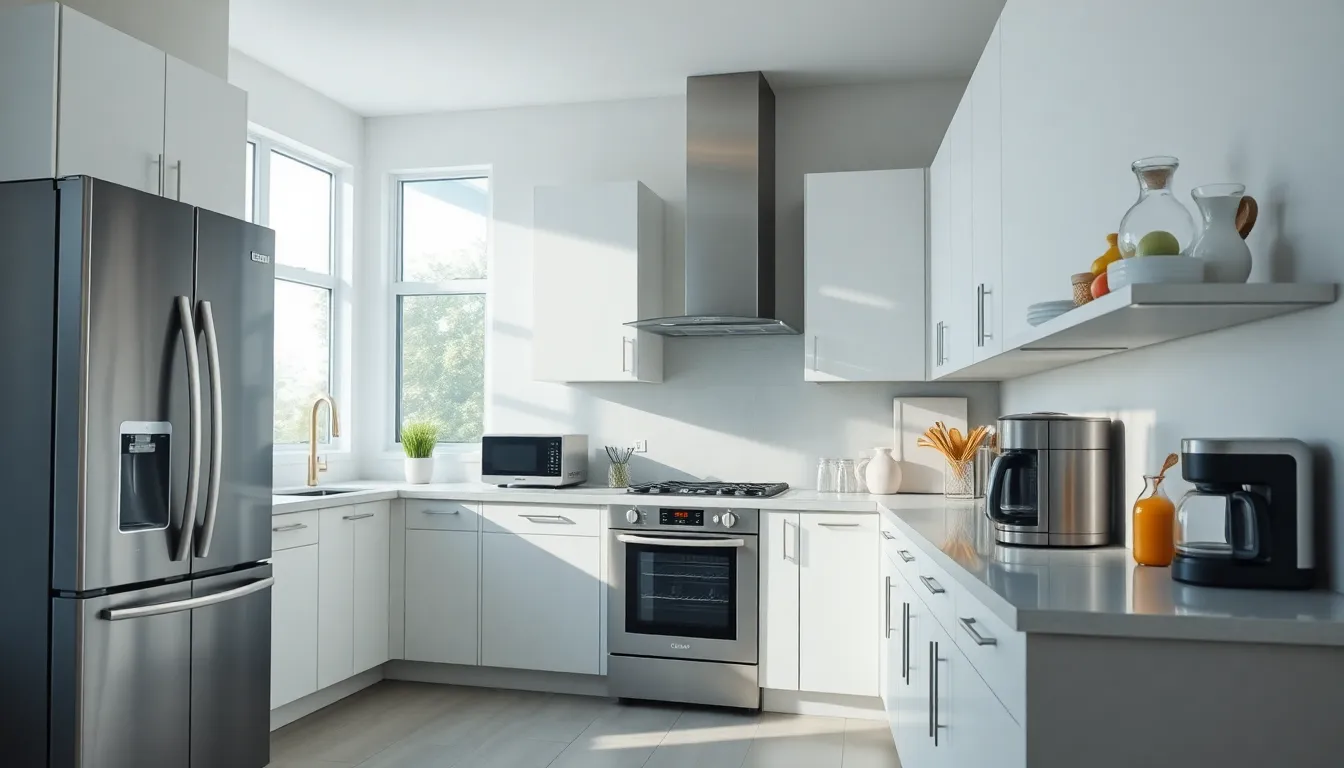In a world where even your fridge can outsmart you, the rise of smart kitchen appliances is nothing short of a culinary revolution. Gone are the days of wrestling with stubborn blenders and timers that never seem to work. Now, kitchens are buzzing with gadgets that not only cook but also chat, remind, and even entertain—because who doesn’t want a toaster that can tell a joke?
Imagine whipping up a gourmet meal while your oven monitors the temperature and your coffee maker brews the perfect cup—all while you lounge in your pajamas. Smart kitchen appliances are here to transform the mundane into the extraordinary, making cooking feel less like a chore and more like a fun adventure. With these tech-savvy helpers, dinner parties will be a breeze, and you might just impress your guests—or at least your dog.
Table of Contents
ToggleOverview of Smart Kitchen Appliances
Smart kitchen appliances represent a significant leap in technology and cooking convenience. Devices such as smart ovens, refrigerators, and coffee makers allow users to control them remotely through smartphone applications. These features enable individuals to preheat ovens or check refrigerator contents from anywhere.
Energy efficiency often stands out as a major benefit of smart appliances. Many models offer energy-saving modes, helping to reduce electricity bills while minimizing environmental impact. For instance, smart dishwashers adjust water usage based on load size, pausing unnecessary cycles.
Connectivity plays a crucial role in smart kitchens. Many appliances interact with one another through home automation systems. A user may start a cooking process on a smart oven while the smart fridge suggests recipes based on available ingredients.
Safety features also enhance smart kitchen appliances. Certain models include automatic shut-off mechanisms, ensuring devices turn off when not in use. This capability significantly reduces fire hazards linked to cooking appliances.
User-friendliness characterizes the smart kitchen experience. Intuitive interfaces and voice control options simplify operation, making these devices accessible for all ages. Cooking timers and reminders can be set through voice commands, allowing multitasking during meal preparation.
Smart appliances continue to evolve, introducing advanced functionalities like artificial intelligence and machine learning. As these technologies develop, the kitchen experience will become even more seamless and interactive. Cooking transforms into a modern, fun activity with the integration of smart technology.
Benefits of Smart Kitchen Appliances

Smart kitchen appliances offer significant advantages that enhance the cooking experience. User-friendly technology and advanced features simplify meal preparation and improve overall kitchen efficiency.
Convenience and Efficiency
Smart kitchen appliances streamline cooking tasks, making everyday cooking more enjoyable. They provide remote access via smartphone applications, allowing for preheating ovens or adjusting settings from anywhere. Instant notifications about cooking progress save time, reducing the chance of overcooking meals. Recipe suggestions based on available ingredients enable users to maximize their pantry items. Full integration with home automation systems allows seamless operations, creating a connected kitchen environment. Enhanced safety features, such as automatic shut-off functions, also promote peace of mind while cooking, ensuring that meals cook without constant supervision.
Energy Saving Features
Energy-saving capabilities of smart kitchen appliances contribute to lower electricity bills. Many devices include energy-efficient modes that adjust operation based on usage patterns. Refrigerators with smart technology minimize energy consumption by optimizing cooling schedules according to user habits. Smart ovens often employ sensors to ensure precise temperature control, minimizing energy waste. Users save up to 30% on energy use with these modern appliances. Moreover, the ability to monitor appliance energy use in real-time empowers users to make informed decisions about their kitchen’s energy efficiency.
Types of Smart Kitchen Appliances
Smart kitchen appliances come in various types, each designed to enhance cooking and meal preparation. These innovative tools streamline tasks and improve overall kitchen efficiency.
Smart Refrigerators
Smart refrigerators offer numerous features that simplify food management. Users can view interior contents remotely through smartphone apps. Some models provide alerts for expired items or low supplies, ensuring users never run out of essentials. Additionally, integrated touchscreen displays allow for meal planning and recipe suggestions. Energy-saving modes on smart refrigerators optimize power use, contributing to lower electricity bills.
Smart Ovens and Ranges
Smart ovens and ranges revolutionize cooking with precise control capabilities. Remote operation enables users to preheat the oven while away from home. Many models include voice control integrations, allowing simple commands for adjustments. Some smart ovens even feature built-in cameras to monitor food while it cooks. Enhanced cooking modes, such as air frying or convection baking, deliver versatile meal options.
Smart Dishwashers
Smart dishwashers bring convenience to cleaning up after meals. Users can schedule cycles and receive notifications about wash progress through mobile apps. Many smart models allow for cycle customization based on load size and soil level. Some dishwashers incorporate energy-efficient settings, reducing water and electricity consumption while maintaining cleaning performance. Additionally, sensors can detect when dishes are clean, optimizing water use.
Smart Small Appliances
Smart small appliances include a variety of gadgets like coffee makers, blenders, and slow cookers. Remote operation lets users prepare drinks or meals from anywhere in the house. Certain models offer features like programmable settings and self-cleaning functions. User-friendly interfaces ensure accessibility for all ages. With connectivity options, these devices can sync with other smart appliances for coordinated cooking and meal preparation.
Considerations When Choosing Smart Kitchen Appliances
Selecting smart kitchen appliances involves critical factors that affect performance and user satisfaction. Understanding these can lead to a more informed decision.
Budget Factors
Budget plays a significant role in selecting smart kitchen appliances. Prices vary widely, influenced by features and brand reputation. Consumers often find basic models priced around $100, while high-end options can exceed $1,500. Setting a budget helps narrow choices while balancing cost with necessary features. An individual may prioritize energy efficiency features, as these can lead to savings over time. Additionally, some appliances offer financing options, making them more accessible for households concerned about upfront costs.
Compatibility with Home Automation Systems
Compatibility with existing home automation systems is crucial when choosing smart kitchen appliances. Many appliances support popular platforms like Amazon Alexa, Google Assistant, and Apple HomeKit. Confirming compatibility ensures seamless integration with users’ current smart home ecosystems. Appliances that connect easily can enhance overall convenience, allowing voice control and app-based management. Checking specifications or consulting user reviews helps identify compatibility, making the process smoother and more efficient. Investing in devices that work well together can elevate the kitchen experience significantly.
Smart kitchen appliances are revolutionizing the way people cook and prepare meals. With their advanced features and connectivity, they not only enhance efficiency but also make cooking more enjoyable. Users can embrace a modern kitchen experience that combines convenience with energy savings.
As technology continues to advance, these appliances will evolve further, offering even more innovative solutions for everyday cooking challenges. Investing in smart kitchen devices isn’t just about upgrading tools; it’s about transforming the entire cooking experience into something seamless and interactive. Embracing these innovations can lead to a more efficient and enjoyable kitchen environment.






